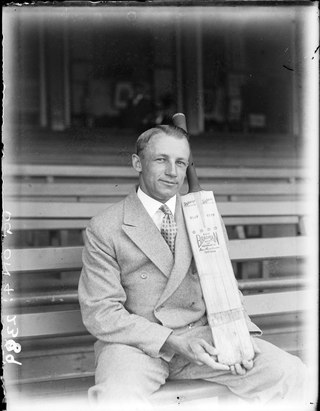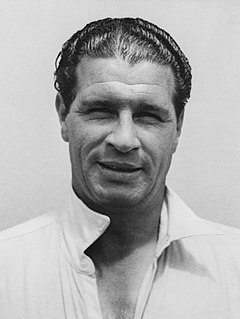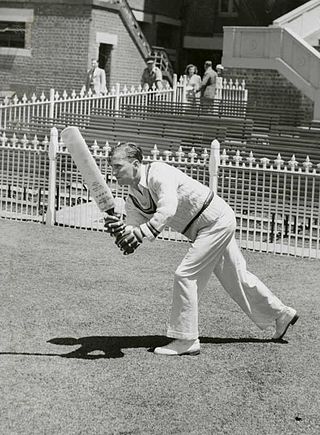
The Australian cricket team in England in 1948 is famous for being the only Test match side to play an entire tour of England without losing a match. This feat earned them the nickname of "The Invincibles", and they are regarded as one of the greatest cricket teams of all time. According to the Australian federal government, the team "is one of Australia's most cherished sporting legends". The team was captained by Don Bradman, who was making his fourth and final tour of England.
Francis James Cameron is a former New Zealand cricketer who played 19 Tests for New Zealand as a fast bowler.
The Indian national cricket team toured England in the 1946 season and played 29 first-class fixtures with 11 wins, 4 defeats and 14 draws. The 1946 season marked a return to normal first-class cricket in England following the end of World War II. The Test series between England and India was the first to be played in England since the West Indies tour in 1939. England won the series 1–0 with two matches drawn, their success largely due to the impact of debutant Alec Bedser who took 22 wickets in his first two Tests.
The New Zealand cricket team toured England in the 1931 season. The tour was the first tour by a New Zealand team in which Test matches were arranged. Originally, only one Test was planned, but New Zealand acquitted themselves so well in the first match and in the game against MCC that matches against Surrey and Lancashire were hastily replaced by two further Test matches. Of the three Tests played, the first was drawn, the second was won comfortably by England; the third was heavily affected by rain and also drawn. The tour as a whole was blighted by poor weather, and 23 of the 32 first-class matches ended as draws.
The New Zealand cricket team toured England in the 1949 season. The team was the fourth official touring side from New Zealand, following those in 1927, 1931 and 1937, and was by some distance the most successful to this date. The four-match Test series with England was shared, every game ending as a draw, and of 35 first-class fixtures, 14 were won, 20 drawn and only one lost.
The New Zealand cricket team toured England in the 1958 season. In a notably wet summer when the touring side lost the equivalent of 29 full days of cricket, the side lost four of the five Test matches. In first-class matches, they won six of their first nine games, but then won only one more all season, although they only lost two matches outside the Tests, both of them to Surrey.
The New Zealand cricket team toured England in the 1969 season to play a three-match Test series against England. The New Zealanders played in the second half of the English season: the England cricket team played three Test matches against the West Indies cricket team in the earlier part of the season, winning that series by 2–0 with one match drawn - see the article West Indian cricket team in England in 1969.
The West Indian cricket team that toured England in the 1928 season was the first to play Test cricket. The team was not very successful, losing all three Tests by an innings and winning only five of the 30 first-class matches played.
The New Zealand national cricket team toured South Africa from October 1953 to February 1954 and played a five match Test series against the South Africa national cricket team. South Africa won the Test series 4–0. The tour was the first by a representative New Zealand side to South Africa and the tourists embarked on their visit without having won a Test match since they had been granted full member status of the Imperial Cricket Conference in 1930.
The New Zealand national cricket team toured South Africa from October 1961 to February 1962 and played a five-match Test series against the South Africa national cricket team. The series was drawn 2–2, with New Zealand's victory in the third Test the team's first Test match win outside their home country. New Zealand captain John Reid scored a total of 1,915 runs during the tour, setting a record for the most runs scored in South Africa by a touring batsman. The tour was the second to South Africa by a team from New Zealand, the previous tour having taken place in 1953–54.

Ernie Toshack was a member of Donald Bradman's famous Australian cricket team, which toured England in 1948 and was undefeated in their 34 matches. This unprecedented feat by a Test side touring England earned Bradman's men the sobriquet The Invincibles.
The New Zealand cricket team toured India in the 1964-65 cricket season. They played four Test matches against the Indian cricket team, with India winning one match and the other three being drawn.

The 1965–66 Ashes series consisted of five cricket Test matches, each of five days with six hours play and eight ball overs. It formed part of the MCC tour of Australia in 1965–66 and the matches outside the Tests were played in the name of the Marylebone Cricket Club. M.J.K. Smith led the England team with the intent on regaining the Ashes lost in the 1958–59 Ashes series, but the series was drawn 1-1 and they were retained by Australia. The Australian team was captained by Bobby Simpson in three Tests, and his vice-captain Brian Booth in two Tests.
The Marylebone Cricket Club tour of Australia in 1965–66 under the captaincy of M.J.K. Smith was its fourteenth since it took official control of overseas tours in 1903-1904. The touring team played as England in the 1965–66 Ashes series against Australia, but as the MCC in all other games. In all there were 24 matches; 5 Test matches, 10 other first-class matches and 9 minor matches. The strength of the team's batting and the weakness of its bowling is shown by having 10 batsmen averaging over 40, but only one bowler under 30, the part-time leg-spinner Ken Barrington. The MCC team manager Billy Griffith encouraged the naturally cautious Smith to make sporting declarations and make run-chases in the tour matches, though this became less prevalent towards the end.

The Marylebone Cricket Club tour of Australia in 1946-47 under the captaincy of Wally Hammond was its ninth since it took official control of overseas tours in 1903-1904 and the first since the Second World War. The touring team played as England in the 1946–47 Ashes series against Australia, but as the MCC in all other games. In all there were 25 matches; 5 Test matches, 13 other First Class matches and 7 minor matches. Australia had been suffering a drought since 1937, but this ended as it rained in every match the MCC played on tour, including tropical thunderstorms twice in Brisbane and again in Sydney. However, this had an adverse effect on the pitches and denied the touring team adequate practice and lead to many draws.
Hammond's ill-equipped army returned to England beaten, yet deserving of the highest honours for their sportsmanship, their ability to smile in the face of certain disaster and also for their success in gaining the objective of their invasion - the spreading of cricket goodwill from the Homeland to a Dominion.
The Marylebone Cricket Club tour of Australia in 1974-75 under the captaincy of Mike Denness was its sixteenth since it took official control of overseas tours in 1903-1904. The touring team played as England in the 1974–75 Ashes series against Australia, but as the MCC in all other games. In all there were 24 matches; 6 Test matches, 9 other First Class matches, a One Day International, which they won, another one-day game, which they lost, and 8 minor matches.
The Pakistan national cricket team toured New Zealand in January and February 1973 and played a three-match Test series against the New Zealand national cricket team. Pakistan won the series 1-0. It was their first Test series win outside Pakistan. In addition, a Limited Overs International (LOI) took place between the second and third Tests; this match was the inaugural LOI of both teams.
The Pakistan national cricket team toured New Zealand from December 1964 to February 1965 and played a three-match Test series against the New Zealand national cricket team. All three Tests were drawn.
The New Zealand national cricket team toured India in 1955-56 season. The teams played five Tests. India won the series 2-0 with three Tests drawn. Before the series, the New Zealand team had played a three-Test series in Pakistan.
The New Zealand cricket team toured Australia in the 1967-68 season. They played four first-class matches and three other matches between 17 November and 12 December 1967. It was New Zealand's first dedicated tour to Australia since 1925-26. However, no Test matches were played.



